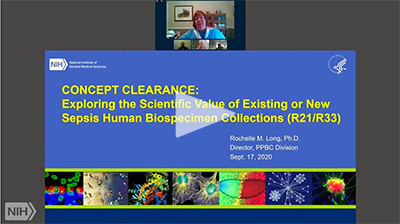The ARDS, Pneumonia, and Sepsis (APS) Consortium is funded through a collaboration between the National Heart, Lung, and Blood Institute and NIGMS. This large observational study will collect longitudinal data and biospecimens from approximately 4,000 adults hospitalized with acute respiratory distress syndrome (ARDS), pneumonia, or sepsis at over 20 hospitals in the United States. The scientific goal is to conduct analyses to gain greater understanding of the biological mechanisms underlying APS and, in particular, to link to well-defined clinical phenotypes.
Continue reading “APS Consortium Study Materials Publicly Available”Tag: Sepsis Research
Notice: NIGMS Support to Utilize Data and Biospecimens Generated by the ARDS, Pneumonia, and Sepsis Phenotyping Consortium
We’ve issued a new notice: NIGMS Support to Utilize Data and Biospecimens Generated by the ARDS, Pneumonia, and Sepsis (APS) Phenotyping Consortium (NOT-GM-24-018). The purpose is to inform investigators that we’ll support studies that fall within the NIGMS mission and utilize biospecimens or data generated from the APS Consortium.
Continue reading “Notice: NIGMS Support to Utilize Data and Biospecimens Generated by the ARDS, Pneumonia, and Sepsis Phenotyping Consortium”Funding Opportunities: The ARDS, Pneumonia, and Sepsis Phenotyping Consortium
We want the research community to know about two funding opportunity announcements (FOAs) that NIGMS has joined as part of an NHLBI initiative to support the formation of a multisite study, the Acute Respiratory Distress Syndrome (ARDS), Pneumonia, and Sepsis Phenotyping (APS) Consortium. The study seeks to better define the heterogeneity underlying critical illness syndromes and to identify the mechanisms of illness development and recovery, as well as relationships and overlap between these syndromes. The FOAs are:
Continue reading “Funding Opportunities: The ARDS, Pneumonia, and Sepsis Phenotyping Consortium”Funding Opportunity: R21/R33 to Test Existing or New Biospecimens from Sepsis Patients
We’ve issued a new funding opportunity announcement (FOA): Exploring the Scientific Value of Existing or New Sepsis Human Biospecimen Collections (R21/R33 – Clinical Trial Not Allowed) (PAR-21-077). This FOA aims to promote the optimal use, testing, and sharing of patient-derived materials. It stems from recommendations of the NAGMSC working group on sepsis and input from the scientific community for strategies to rebalance NIGMS’ investment in sepsis research.
Continue reading “Funding Opportunity: R21/R33 to Test Existing or New Biospecimens from Sepsis Patients”Human Biospecimen Collections for Sepsis Research
At the September meeting of our National Advisory Council, I presented a concept clearance for our next step in response to the recommendations of the working group on sepsis. The videocast of the presentation is now available.
Continue reading “Human Biospecimen Collections for Sepsis Research”NIGMS Priorities for Small Business Development of Sepsis Diagnostics and Therapeutics
Last summer, we published a notice of information on our priorities for sepsis research that applies to all active NIGMS funding opportunity announcements. We’ve now published a notice of special interest (NOT-GM 20-028) to promote early-stage research and development projects through the NIH SBIR/STTR program.
We’re interested in receiving applications from small businesses or from small businesses and their academic partners that propose to develop novel tools and technologies for sepsis research, detection, and treatment. We’re specifically interested in diagnostic tools, predictive clinical algorithms, and technologies to facilitate molecular phenotyping of sepsis patients.
If you have any questions about NIGMS priorities for small business development of sepsis diagnostics and therapeutics, please contact me.
Advancing Sepsis Research: New Models and Novel Approaches
At the September meeting of the NIGMS Advisory Council, I delivered the Institute’s response to the recommendations of the Working Group on Sepsis. For more information, you can watch the videocast of the presentation.
Continue reading “Advancing Sepsis Research: New Models and Novel Approaches”Request for Information on Human Biospecimens for Research on Sepsis
NIGMS wants to advance our understanding of sepsis in order to accelerate improved diagnosis and treatment strategies. Based on the recommendations of our National Advisory General Medical Sciences Council Working Group on Sepsis, we intend to continue our support of fundamental discovery and mechanistic science relevant to sepsis. We recently identified the Institute’s specific priorities for sepsis research in an NIH Guide notice (NOT-GM-19-054). Additionally, the Working Group recommended that NIGMS encourage the use of human clinical materials to facilitate more rapid progress toward better identification, staging, and endotyping of the disease.
Continue reading “Request for Information on Human Biospecimens for Research on Sepsis”Notice of Information on NIGMS Priorities for Sepsis Research
At the recent National Advisory General Medical Sciences (NAGMS) Council meeting, the Recommendations of the NAGMS Working Group on Sepsis were presented. As one of our first responses to the recommendations of this working group, NIGMS has published a Notice of Information on NIGMS Priorities for Sepsis Research.
The Notice of Information provides potential applicants with details of specific research topics that are of special interest to NIGMS as well as those that are considered to be of low priority for funding.
If you have any questions about NIGMS Priorities for Sepsis Research, please contact me.
Recommendations of the NAGMS Working Group on Sepsis
Sepsis is a serious condition that affects about 1.7 million people and causes about 270,000 deaths annually in the U.S. Because it involves multiple organ systems, it is also one of the clinical research areas supported by NIGMS. Despite decades of research, sepsis remains a poorly understood condition with limited diagnostic tools or therapeutic interventions.
Nearly a year ago, we established a working group of our Advisory Council to advise us on how best to advance sepsis research. At last week’s Council meeting, Dr. John Younger and Dr. Monica Kraft, co-chairs of the working group, presented the group’s recommendations:
Continue reading “Recommendations of the NAGMS Working Group on Sepsis”

